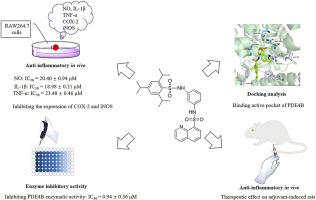European Journal of Medicinal Chemistry ( IF 6.0 ) Pub Date : 2022-05-28 , DOI: 10.1016/j.ejmech.2022.114497 Siqi Xing 1 , Weizheng Fan 1 , Junhua Chen 2 , Jiyu Du 1 , Tongtong Liu 1 , Shuanghong Dong 1 , Jucheng Xia 1 , Peipei Liu 3 , Dexing Zou 2 , Li Cai 4 , Zeng Li 1

|
A total of 31 quinoline-based derivatives were designed and synthesized to develop novel anti-inflammatory drugs. After the toxicity of synthetic compounds to RAW264.7 cells were evaluated in vitro, their anti-inflammatory activity was assessed by inhibiting lipopolysaccharide (LPS)-induced NO production levels in the RAW264.7 cells. Among the derivatives, compound f4 had the best anti-inflammatory activity, which could reduce the production of pro-inflammatory cytokines NO, IL-1β, and TNF-α with corresponding IC50 values of 20.40 ± 0.94, 18.98 ± 0.21 and 23.48 ± 0.46 μM. Western blot showed that f4 could inhibit the expression of LPS-induced inflammatory mediators iNOS and COX-2. Molecular docking showed that f4 could also enter the PDE4B receptor binding pocket, and the cellular thermal shift assay method indicated that the PDE4B protein bound to f4 had increased stability. Meanwhile, the inhibitory effect of this compound on the PDE4B enzyme (IC50 = 0.94 ± 0.36 μM) was comparable to that of the positive drug rolipram (IC50 = 1.04 ± 0.28 μM). Finally, in vivo studies showed that f4 could improve the degree of foot swelling and knee joint pathology in adjuvant-induced arthritic rats and decrease the levels of serum inflammatory factors TNF-α and IL-1β in a dose-dependent manner. Therefore, the development and design of quinoline-based derivatives for anti-inflammatory applications could be considered opportunities and challenges.
中文翻译:

新型喹啉衍生物:一类用于佐剂性关节炎的新型 PDE4B 抑制剂
总共设计和合成了 31 种基于喹啉的衍生物,用于开发新型抗炎药。在体外评估合成化合物对 RAW264.7 细胞的毒性后,通过抑制 RAW264.7 细胞中脂多糖 (LPS) 诱导的 NO 产生水平来评估其抗炎活性。在这些衍生物中,化合物f4具有最好的抗炎活性,可以减少促炎细胞因子NO、IL-1β和TNF-α的产生,相应的IC 50值为20.40 ± 0.94、18.98 ± 0.21和23.48 ± 0.46 微米。Western blot显示f4可以抑制LPS诱导的炎症介质iNOS和COX-2的表达。分子对接表明f4也可以进入PDE4B受体结合口袋,细胞热位移测定法表明与f4结合的PDE4B蛋白稳定性增加。同时,该化合物对PDE4B酶的抑制作用(IC 50 = 0.94 ± 0.36 μM)与阳性药物咯利普兰(IC 50 = 1.04 ± 0.28 μM)相当。最后,体内研究表明,f4可改善佐剂性关节炎大鼠足肿胀程度和膝关节病变,降低血清炎症因子 TNF-α 和 IL-1β 水平,呈剂量依赖性。因此,开发和设计用于抗炎应用的喹啉衍生物可以被视为机遇和挑战。











































 京公网安备 11010802027423号
京公网安备 11010802027423号